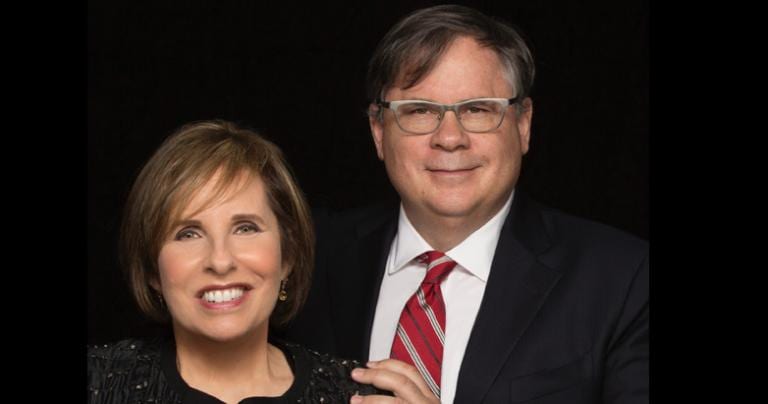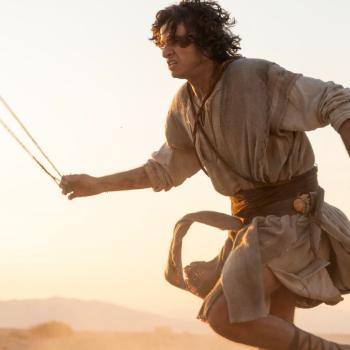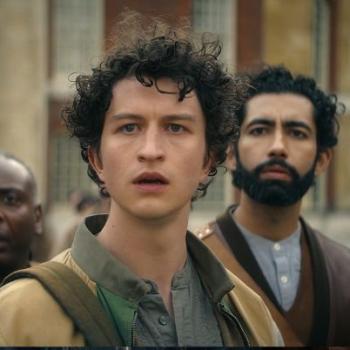Writers and producers Robert and Michelle King successfully launched the hit CBS dramas “The Good Wife” and “The Good Fight” before turning their attention to the supernatural with this season’s debut, “Evil.” Starring Katja Herberts, Mike Colter, and Aasif Mandvi, the procedural drama follows a trio who investigate phenomena such as demonic possessions, angels, healings, and miracles.

For the Kings, who have worked together since marrying in 1987, “Evil” is a chance to explore a spirituality sometimes overlooked by prime time but embraced by millions. In this exclusive interview, they talk about the success of their previous shows as well as what may lie ahead for the rest of this year’s freshman drama, which was recently renewed for season two.
Anytime someone decides to dive into religion or issues of faith on TV, sometimes it’s a hit and sometimes it’s a miss. What were your thoughts in the going and kind of exploring this with the show? Did you have any hesitation?
Michelle King: I will speak for myself. I didn’t have hesitations because I knew we had control of things. And we were very determined that there would be nothing dismissive or patronizing or ugly about the way that the Church or religion, in general, was treated.
Robert King: And for us, part of one of the reasons we do the TV work, unlike features, is it’s personal, with Michelle and myself. We’re a mixed marriage in that I’m observing Catholic and Michelle, how you would define it?
Michelle King: I’m a secular Jew, but we’ve been married for 32 years, so we’re getting used to this.
Robert King: So, one of the things we want to do is have these conversations we have about life, whether issues of miracles or prayer or even evil and how it happens in the world. We want to express those. I think we just started with this idea. Even though it will have sensationalistic elements, we did not want that to be the core of it.
So how have you felt from the response from the show? Has that energized you? It has to feel good to be renewed for a second season.
Robert King: It’s so good when you’re the company that is financing because you’re always going out on a limb. With “The Good Wife,” the first year, we never thought we’d go past 13 episodes. When they renew you, it just gives you a feeling of a little bit of wind in your sails. I would say with this show, especially because it’s so unlike what CBS usually does, I know CBS wants to push themselves to do different things. And I think it’s a show that has religion in it, but it’s still trying to appeal to the “Hannibal” audience, the audience that likes things that are creepy and a little bit worrisome, and dangerous. There’s an element of danger.
I think when I first started watching the show, I thought it had been mistitled because it’s not all “Evil,” when you’re discovering angels or whatever, but you have enough creepy, such as Dr. Leland Townsend (Michael Emerson) to justify that title.
Robert King: And also, there’s a character where there’s a question whether she’s a prophet or not, comes up. I think can be the more fun parts of the show, it doesn’t need to stick to “Oh, here’s the serial killer of the week.” Because yeah, a that would get tedious and be, it doesn’t fit what we want it to do which in spite of or even because of the title, “Evil,” we want to explore the things that are battling evil, not just our three lead characters, but miracles or prayer or, in the case of this prophet. Those are the people battling people in our show.
As a person of faith, when I’ve watched spiritual battles, I realize there really is more than what meets the eye. There is spiritual warfare going on. I appreciate you exploring that.
Michelle King: Thank you. We were also very committed that to stay away from TV clichés, because so very often if TV introduces, say, a priest, half an hour later, you’re going to find out he’s a molester. And we were not interested in going down that road.
What’s ahead on the show? I know you don’t want to give away a bunch of spoilers or whatever. But what do you see?
Robert King:. There are a few things we’re pursuing. Michelle and I have been troubled by the community of psychopaths online. Whether it’s intels getting together and they encourage people to pick up guns and become lone gunmen. Or, you know, people on 8Chan talking to each other and doing villainous things, partly because sometimes villainy is fun, especially for people who are loners. So, we have an episode this Thursday (December 12) that addresses that. And then we actually have a Christmas episode. That is the week after that. And what we love is the idea of these daughters of Kristen, these four daughters. She’s so worried that the of their innocence is under attack. And what we want is go a little deeper into how children and young kids or young girls, in this case, are influenced, whether through influencers online, which the Christmas episode is about. These are the young women, they teach them how to do makeup or dress correctly. But also, there are influencers that can kind of encourage a darker sense of humor or darker sense of the world and even lean towards nihilism. So, we wanted that we wanted a Christmas episode that wasn’t all happy and cheerful, but I think it does it sort of in a comic way, too. So, it’s a little bit of everything.
That’s great. I have kids, and it’s been a concern of mine as they get into media. It’s not that we just look out for the worst thing that they can pick up, but sometimes it’s just subtle attitude changes.
Robert King: I think that’s right. The show doesn’t go into the influence of porn or anything. It actually goes into the influence of something that’s more pitched at a young person’s point of view. So, I mean, that’s part of it is morality, but part of it is the direct influence of certain elements of evil, you know?
.
You both are very successful at crafting shows. And this feels like it’s the golden age of television or series. So how does it feel to be part of that?
Michelle King: It’s wonderful to be making television in an age where people take television seriously, in a way that 30 years ago people only spoke of film seriously and TV was really either ignored or patronized. I would say the only negative is if you’re making TV in a town where everybody else is, it’s a little bit harder to find crew members, but that’s a small price to pay.
Robert King: The only thing I’d add is that there’s a man named Shane Black, who is a screenwriter and now director. He wrote “Lethal Weapon” and so on, and he was complimenting William Goldman who wrote, “Butch Cassidy and the Sundance Kid.” He said, “I really envy you” and William Goldman asks, “Why?” “Because you got to make movies in the Seventies.” And I do think what’s going on now with TV is TV’s version of making movies in the Seventies, where people can make very idiosyncratic, but also very personal projects, which is even more important, very personal shows that have a voice. And one thing we like about TV is it basically gives you final cut. So much of what we read about feature directors is this fear of losing final cut, where TV has to move so fast, you basically do have final cut, because there aren’t that many. There’s not much time for notes. Because we just finished editing the episode that’s going to broadcast in a week and a half from now. Everything is done in days, not in weeks, so or in months, or even years as features. So, we’re thrilled this is you know, I hope it continues. I don’t know if it will because of the big guys, you know with the Disney pluses and the Apple streaming. We don’t know how long this could continue, but we are ready to ride it as long as we can.












